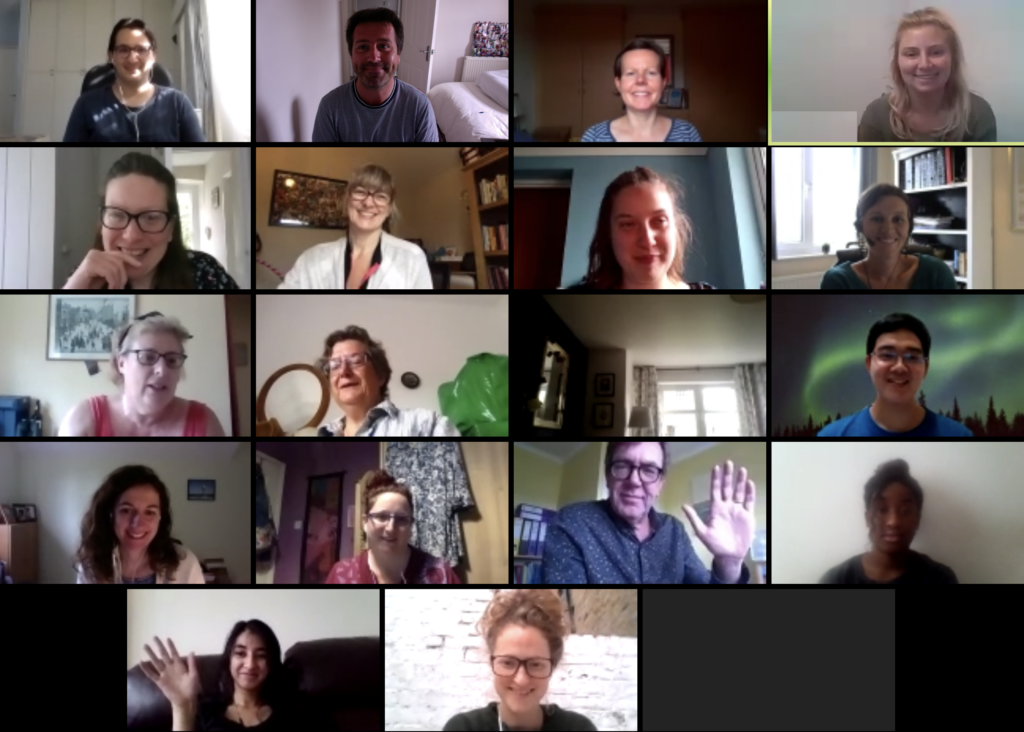
Depression and anxiety are two of the most common mental health conditions and they might occur together or on their own. There are lots of things that can help people with these mental health problems, but sometimes people have to wait to get the help they need. Antidepressants take time to work (if they work at all) and talking treatments sometimes have a long waiting list.
A recent US study (Graham et al, 2020) was conducted to investigate whether a digital platform with multiple apps and support from a coach could improve symptoms of depression and/or anxiety.
Digital interventions can provide a tailored and modern approach to improve mental health to suit individual needs. Technology-based treatments might suit younger people, but also give older people an opportunity to access support through technology.
The theory with scalable digital interventions is that they can provide more choice for people and help to reduce waiting times as part of a stepped care approach. They are also low cost.
This blog has been written by a group of people who attended a Mental Elf blogging workshop that took place online on 15th July 2020. Our group consisted of people with lived experience of mental illness, peer researchers and clinicians. We had a fun afternoon with the elves in the woodland and this here blog is the result!
Just to set the scene, our personal reflections about digital mental health going into this discussion were both positive and cautionary:
- The COVID-19 pandemic has forced many of us to go digital, so now might be the perfect time to embrace digital interventions for mental health problems
- At the same time, let’s make sure that digital doesn’t replace face-to-face support.

Pandemics force us to use digital technology more, so let’s hope for a golden era in digital interventions to help people with common mental health problems.
Methods
This was a randomised controlled trial with allocation concealment and intention to treat (Graham et al, 2020). These are good things which are likely to mean that the treatment and control groups can be compared reliably.
Participants were 146 adults in primary care who responded to an invitation to participate, had appropriate mobile phone technology and who had moderate symptoms of depression or anxiety. Participants were paid to take part in this study.
In the intervention group, participants received access to a suite of digital mental health apps (IntelliCare) and guidance and support from a coach. Coaches recommended apps based on the participants’ needs and preferences.
The control group was a waiting list. Participants in this group were given their usual care for 8 weeks before being given access to the IntelliCare suite.
Outcomes were symptom scores, self-assessed at 4, 8, 12 and 16 weeks, using standardised scales for depression and anxiety (PHQ, GAD).
Results
The paper reports that patients who were randomised to the mobile app platform:
…achieved greater reductions in depression and anxiety and higher odds of recovery compared with treatment as usual wait-list control individuals.
The overall view from our workshop was that this research paper looked good, but we did have some concerns.
- The measurement tools used (PHQ-8 and GAD-7) as the primary outcomes may not fully capture the what matters to patients
- The secondary outcome, which reported the odds of “recovery” (as defined as a threshold of improvement in symptom scores), had very wide confidence intervals. This increases our uncertainty around the estimate of the effects of the interventions
- There was an imbalance in terms of gender, which makes the study findings less generalisable
- We queried the short follow-up period (16 weeks, with app use reported at 8 weeks follow up) and noted that there was little reported in the study about the coaching involvement.

The authors claim that this trial “supports the movement of digital mental health interventions from single apps for depression or anxiety to platform approaches containing multiple brief apps that patients can bundle to meet their needs and fit into the fabric of their lives”.
Conclusions
The paper concludes:
In this trial, a mobile intervention app was effective for depression and anxiety among primary care patients. Findings also support designing digital mental health interventions as platforms containing simple, brief apps that can be bundled by users to meet their needs.
This is an important trial in context of COVID-19. It introduces the potential value of a suite of apps and app technology in general for people with depression and/or anxiety. The conclusions about effectiveness may not be warranted (too simplified), and it’s also worth bearing in mind that these were guided digital interventions (a coach supporting the patient to choose and use different mobile apps), which may not generalise to the UK context.
The study was looking at efficacy (usually used in tightly controlled ‘ideal’ conditions of a trial), but the conclusions refer to effectiveness (normally thought of as what might be expected in real life).
Strengths and limitations
The sample, which included participants identified by screening, may not be representative of all groups.
- More severely ill participants were excluded
- English literacy, ability and technology exclusions were placed on participation.
The sample size was too small to give a definitive result, or explore any details around the impact of age, gender and other individual characteristics on response to the intervention. We do know that only 81% engaged with it.
It is not all that clear what the intervention actually was: how much is due to the coaching and how much due to use of the apps; what apps actually did and how they were used.
We also note:
- 8 weeks is a very short follow-up period
- The paper didn’t provide details on how people were treated (e.g. with pharmacological treatments)
- Engagement was patchy and “skewed”. This influenced how they presented the data
- Level of user engagement did not correlate with improvements in symptom scores
- Alerts and prompts may have helped with this
- This kind of intervention may have a role for people who are isolated, having difficulty accessing a GP etc
Outcomes were self-reported and the fact that people were paid to participate in the research may have influenced their responses.
One of the study authors (Dr David Mohr) has an “ownership interest in Adaptive Health Inc, which has a license from Northwestern University to commercialise Intellicare” (the mobile app platform used in this study). It’s common practice for app developers to lead or be involved in digital health research, but this potential conflict of interest is an important consideration.
What do the means even mean?
- There is very little detail about how the mean improvement scores in the results of this paper were worked out. We hope that the researchers can provide some more detail on this, as we weren’t at all sure why they chose this way to measure and report results.
- For the secondary outcome (the proportion of patients who achieved recovery), the benefits had a very wide confidence interval.
The overall findings indicate that the intervention may be helpful, but this evaluation is too short, too small and does not provide enough detail to be sure.
There’s disappointingly little information in the paper about the mobile app intervention (Intellicare suite). It seems to be an open platform built for patients to use on their Apple or Android phones, which has been around for a few years (Lattie et al, 2016), which was used in this study with the support of coaches who communicate via SMS text messages with patients.

Bigger, more representative, and longer real-world studies are now needed to find out if mobile app platforms are an appropriate way to deliver care for people with depression and anxiety in the UK.
Implications for practice
The authors say that this is the first study of its kind, exploring the benefits of a mobile app suite supported by a coach for anxiety or depression presenting in primary care. Our view is that this study has no implications for clinical practice.
However, it does lead to some interesting follow-up research questions. We’d like to see:
- Bigger and more representative studies, with longer follow-up
- Wait list controls are biased, so we’d rather see treatment as usual controls, or active interventions (e.g. CBT, other digital interventions)
- Future research should not exclude people who don’t have phones. Give them the tech and teach them how to use it!
- Let’s find out how this type of platform intervention can be integrated into existing stepped care approaches for common mental health problems in primary care.
It’s important to remember that digital mental health interventions may be the most viable or feasible option for many people, especially now during a pandemic where access to conventional mental health services is a problem for lots of us. In addition, many people have always stayed away from health services because of the stigma attached to mental illness. Perhaps digital interventions are especially suited to this group?
We saw very little in this paper about coproduction and the involvement of people with lived experience of depression and anxiety. That may simply be because the authors were pushed for space by the journal. Perhaps people with lived experience were involved from the very beginning as the protocol for the trial was being drafted and the digital interventions were being sketched out. We hope so.
Future research could use mixed methods and include qualitative interviews in trials that can help capture what participants like or dislike about the intervention. That’s always the $6m question in this digital mental health field – what is the “active ingredient” in this intervention?
Future research could also explore what training is most appropriate and effective for the coaches who guide patients through their use of these app platform. Cost-effectiveness studies would also help commissioners and policy makers decide when evidence can be applied in their local setting.

Future research could use mixed methods to find out more about what patients think, which may help discover more about the active ingredients in digital interventions.
Writing a Mental Elf blog
Overall, we had a very tiring but satisfying afternoon, working with the Mental Elf team, appraising this recent paper (Graham et al, 2020) and writing this blog. We hope you’ve found it an interesting read. If the elves ever ask you if you fancy joining a blogging workshop with them, we suggest you bite their tiny little hands off!
If you’re in a group who would like the elves to run an online blogging workshop for you, please drop us a line. We’re especially keen to work with groups of lived experience peer researchers, existing journals clubs in universities or healthcare settings, and postgraduate training programmes. Blogging about a new research paper is a great way to learn new critical appraisal, writing and social media skills. Plus, your blog will be read by thousands of people!

Thanks to everyone who joined in our Cochrane blogging workshop on 15th July.
Statement of interests
None.
Links
Primary paper
Graham AK, Greene CJ, Kwasny MJ, et al. Coached Mobile App Platform for the Treatment of Depression and Anxiety Among Primary Care Patients: A Randomized Clinical Trial. JAMA Psychiatry. Published online May 20, 2020. doi:10.1001/jamapsychiatry.2020.1011
Other references
Lattie EG, Schueller SM, Sargent E, et al. Uptake and Usage of IntelliCare: A Publicly Available Suite of Mental Health and Well-Being Apps. Internet Interv. 2016;4(2):152-158. doi:10.1016/j.invent.2016.06.003
Photo credits
- Photo by Tim Mossholder on Unsplash
